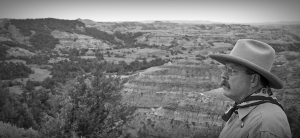“It was a land of vast silent spaces, of lonely rivers and plains, where the wild game stared at the passing horseman”. – TR
It’s one thing to visit Theodore Roosevelt National Park as a tourist taking in the sites. It’s a whole different experience trying to visit as Roosevelt, attempting to absorb and understand Roosevelt’s experience and his metamorphosis into a ranch man.
I found myself waking up early and stepping outside to just listen to the wind blowing the tree tops; song birds calling out, seeking their mates. I watched the colors of the buttes change as the sun painted them or clouds dusted them with shadow. The key thing I did differently on this visit unlike past visits, was I tried to imagine what Roosevelt was thinking, feeling – as he sorted out his future without a wife or a mother. How this land must have looked to him, the quiet solitude so different from a life of fast-paced politics and a growing New York city.
If he was looking for a place that he could hide, to contemplate his future, I can think of no better.
Once down by the Little Missouri, you are surrounded by multi-color canyon walls that isolate you while thirsty cottonwoods shade you. Birds fill the trees, and the slow gurgle of the water lulls you slightly as you just listen to nature work her wonders. The air is dry, the ground crunching under you as you step forward, the scent of the sage plants adding a spiritual aroma to the experience.
I thought of TR in his rocking chair on the porch, reading a book but also taking careful inventory in his mind of the animals he could observe. His memory only slowly eroded of the tragedy of losing his beloved on the same day. I could imagine sorrow being replaced with hard, rugged work. The kind of work that is not for a paycheck, but real, honest survival. This is a harsh land, unforgiving to fools who dare cross it without knowledge: Rattle snakes, quick sand and loose gravel near cliff edges lay in wait to reach out and grab the passerby. This is the perfect place to find your strength – to test your mettle and push your abilities. There was little room for error. If you went out alone without the skills you needed, there was a significant reality that you might never return. Do or die.
Roosevelt was in mourning. He was in the right kind of environment that if he wanted to “give up” – the land would gladly accommodate him. But it is also the kind of place that awakens you as well and thankfully, this is what it did for him. The challenge for survival was embraced by him and he took it head-on. Roosevelt would take this lesson and apply it each day for the rest of his life.
He would later say of the experience: “I would never have become President, if it were not for my time in the Dakota’s”
The badlands are a place each American should visit, and especially those who are interested in Theodore Roosevelt. They, like him, are rugged, unique and inspiring.
